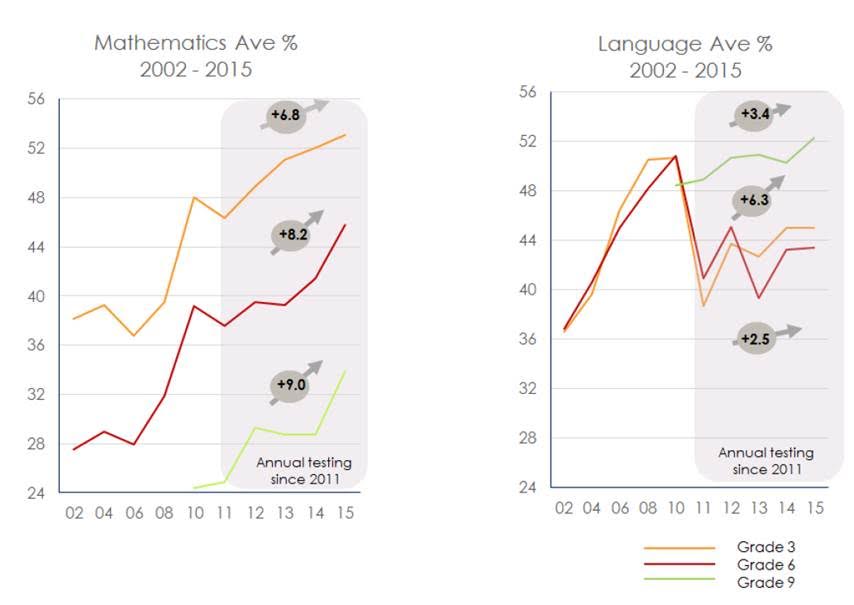
Graphs showing a correlation between systemic tests and rise in average math and language marks.
Supplied by WCED
18 October 2016
The Western Cape Education Department (WCED) is conducting systemic tests during October to assess the knowledge and skills of learners in language and mathematics in Grades 3, 6 and 9.
The tests tell us exactly what we have to do to improve performance in language and mathematics, which provide the foundation for all learning.
We use the data to plan remedial interventions on all levels, including teacher training and support, school leadership and management support, and improvement plans for schools, districts and the department as a whole.
Independent service providers set, administer and mark the tests to provide objective results needed to compare progress reliably year-on-year, and to identify areas needing attention.
The tests are central to achieving the department’s three strategic objectives, namely to:
The goals are all related. We have to build foundations for learning in primary schools to ensure sustained and improved learning in high school, good matric results, and success in further learning and the world of work.
The WCED is a learning organisation that values ongoing reflection based on valid and reliable data to inform initiatives that are most likely to benefit every child in all our schools.
We have to know exactly what we mean by quality education, and how we measure this, both qualitatively and quantitatively. We can’t fix what we can’t measure.
The WCED agrees with research, such as that by Hoadley and Muller, on the benefits of systemic testing, which can be summarised as follows:
The South African Democratic Teachers Union (Sadtu) has challenged the value of the tests and has called on its members to boycott them. This provides an opportunity to review the contribution of the tests to improving the education system as a whole.
Sadtu’s claims include the following:
Firstly, the tests place no additional burden on learners. The learners concerned only write the tests once every three years, at the end of Grades 3, 6 and 9. The tests take place on only one day.
Given the value of the tests to the entire system, the time set aside for these tests is time well spent.
By testing annually, the department ensures that every cohort of learners is tested.
The tests represent no burden for teachers, because independent service providers set, administer and mark the tests.
Secondly, we agree that our primary focus should be on interventions. This does not mean that we should scrap systemic testing.
The whole point of the tests is to identify areas needing remedial action, interventions and special support.
The WCED has implemented a wide range of interventions over the years, based on test results, including the following:
Thirdly, the claim that annual testing is not yielding the change needed is simply untrue.
Independent research has shown that these interventions have helped to reduce the gap significantly between high performing and low performing schools.
The tests also show that there are no quick fixes and that improvement depends on continuous, well-informed attention to detail, based on objective assessment.
The 2015 tests showed reasonable improvement in language results, despite the introduction of more difficult texts in the tests in 2011.
We were pleased to note a significant improvement in mathematics results, especially in Grade 6 in 2015, which augurs well for mathematics in high school over the next five years.
We would not have known this if attempts last year to disrupt the tests were successful.
The annual tests have shown that interventions do work, while also indicating the work still required to improve results further.
They show that we are still far from meeting international benchmarks, and we will have to continue using the tests to guide our planning and to set annual targets.
Fourthly, the tests most definitely have a development aspect. The WCED’s objectives are fundamentally developmental, as indicated.
Lastly, the aim of the tests is not to “blame teachers”. The tests provide detailed information that we use to build on strengths and to address weaknesses. We place a high priority on continuous professional development, and as a responsible, employer, we have to inform teachers of areas needing attention and provide training and support, in the best interests of learners.
At the same time, we have to hold all role players to account to ensure systemic improvement on all levels. This includes political principals, senior officials, district and circuit managers, principals, school management teams and teachers.
Poor results are an indictment of system as a whole and we have to work together to ensure that we give all children every possible opportunity to flourish and to realise their potential.
Views expressed are not necessarily GroundUp’s.